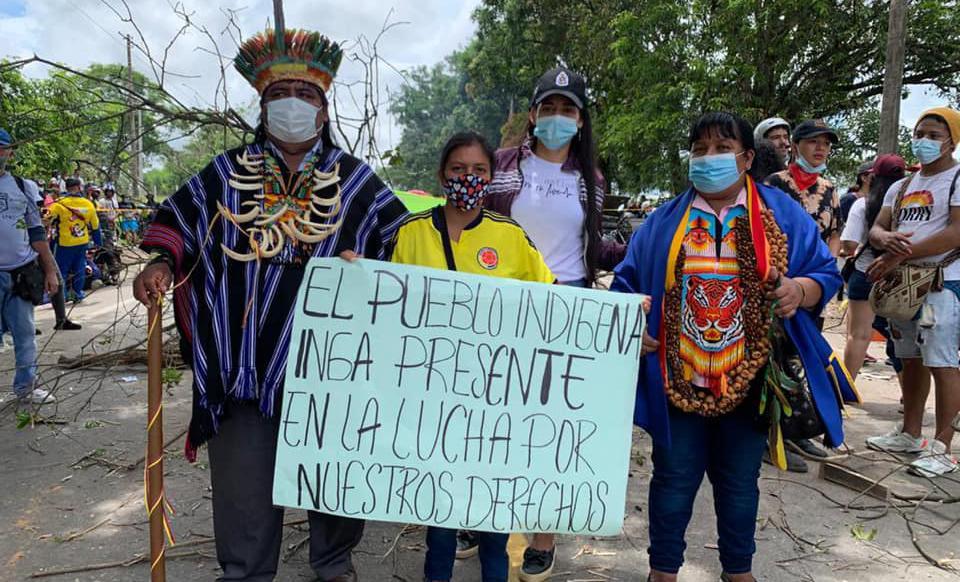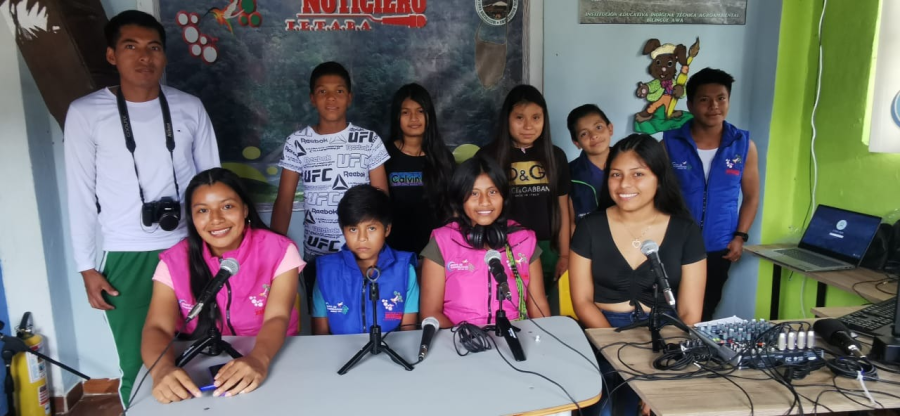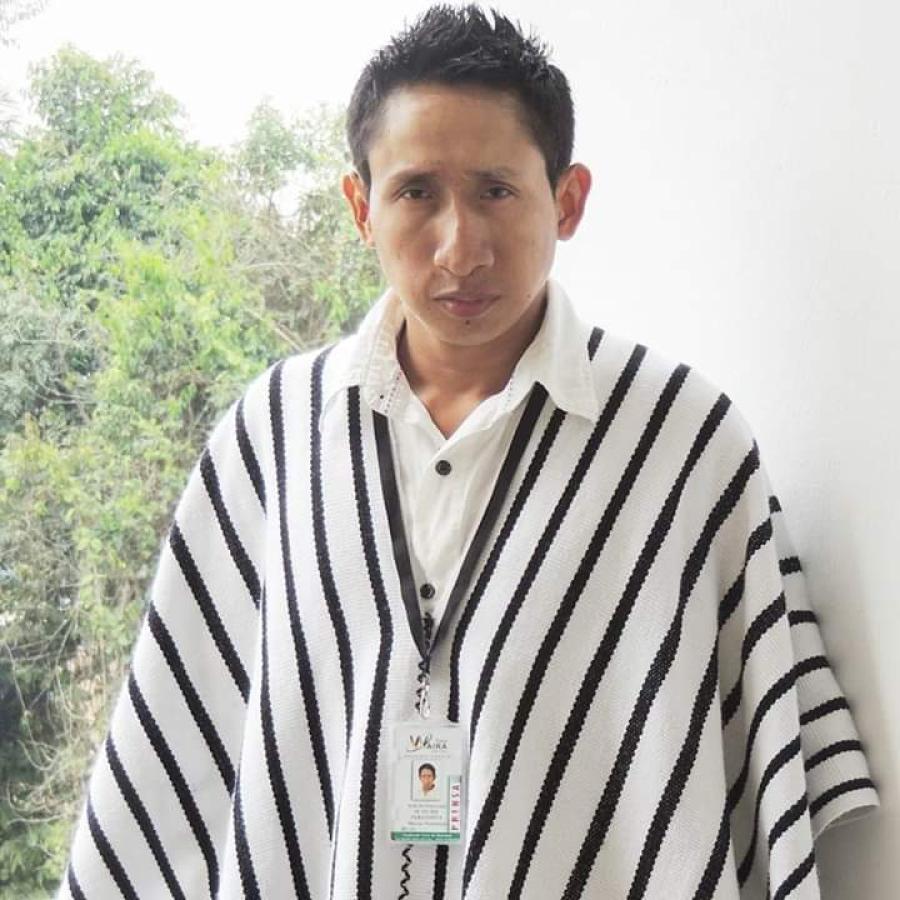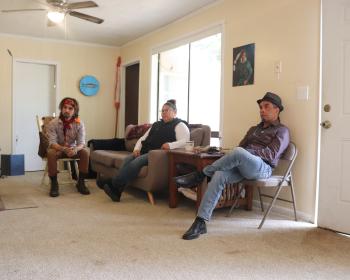
Photo by Organización Nacional Indígena de Colombia
By Katia Yoza
Local and regional Indigenous organizations in Colombia demand that President Iván Duque's government stop using violence against Colombian Peoples. On May 4, 2021, the National Indigenous Organization of Colombia (Organización Nacional Indígena de Colombia or ONIC), which unites Indigenous Peoples in the country, branded the violent repression of the government as "state terrorism" after armed attacks against civilians. ONIC condemned Duque's government and the collusion of Defense Minister Diego Molano and the National Army Commanding General Eduardo Zapateiro. ONIC compared the civilian deaths to typical brutality characteristic of a military dictatorship disguised as democracy, not only because of recent assassinations and forced disappearances but also due to sexual assaults on women and a large number of people injured from state-sponsored brutality.
Since April 28, 2021, massive protests have spread across Colombia rejecting President Duque’s proposal for a tax reform called Sustainable Solidarity Law ("Ley de solidaridad sostenible"). This reform project, which has since been canceled by Duque because of the demonstrations, planned to overcome the budget deficit by increasing value-added taxes, affecting essential goods and services such as water, electricity, and gas public services. The tax increase would affect mainly middle and low classes who have also been most affected by the COVID-19 pandemic. Demonstrations coincided with the third wave of COVID-19 in Colombia, which has brought the highest number of infections since the start of the pandemic. One protest poster read, "If people rise in protest during a pandemic, it is because the government is more dangerous than the virus." Protests are the convergence of pre-pandemic social discontent against the neoliberal capitalist model and the corruption-plagued Duque administration. The discontent has increased in the past months following the growth of poverty and unemployment of millions of Colombians due to poor governance during the health emergency. According to the National Direction of Statistics of Colombia (DANE), 1 out of 4 families went from eating three meals per day to only two and, according to La República journal, unemployment reached 14.2% in March 2021.
Indigenous Peoples have been vocal about their support for the national strike involving youth, workers, campesinos, drivers, and students. Indigenous Peoples joined the national strike with their "Minga hacia afuera" mobilization, which is growing in the south-western region of the country. ONIC demands that the government stop treating social protests as matters of war, and calls for the removal of the national army and Mobile Anti-Disturbances Squadron (Escuadrón Móvil Antidisturbios, ESMAD) from the streets, as they have been using military weapons against civilians.
Despite cancelation of the tax reform, intense protests in Colombia continue. The Regional Indigenous Council of the department of Caldas (CRIDEC) highlights the change in protest focus from being a reaction against the tax reform to a collective response that unites Indigenous Peoples, Afro-descendants, campesinos, workers, women, LGBTQIA+ groups, labor unions, students, teachers and health workers against the high levels of inequality and structural violence. In Caldas, CRIDEC united 6,000 people from different Indigenous Peoples to demand Indigenous Peoples’ rights to Free, Prior and Informed Consent, as well as the creation of health policies that respond to the needs of the population. In addition, Indigenous Peoples demand the implementation of the Peace Accords, as Indigenous territories have been threatened by the reconfiguration of the armed conflict.
In this context, Embera Chami Peoples from Caldas have put out a call for peace and social well-being in the face of systemic violence against their lands and ancestral authorities. A wave of extreme violence has threatened the human rights and collective rights of Indigenous Peoples to self-determination, in spite of the Peace Treaties signed in 2016. Nasa Peoples from Cauca have been among the most impacted. The Regional Indigenous Council of Cauca (CRIC) denounced this violence as genocide. Violent and deadly attacks have increased since the signing of the Peace Treaties. After President Duque came to power in 2018, the year was characterized by an exponential growth of violence—43.7% more than the previous year, with 634 violent or deadly attacks. In 2018-2019, 43% of the Human Rights defenders who were killed were Indigenous People or Afro-descendants. Cultural Survival’s 2019 report to the UN Commission for the Elimination of Racial Discrimination (CERD) on human rights violations in Colombia highlighted the systematic nature of this violence which seeks to intimidate Indigenous and Afro-descendent communities because of their efforts to reclaim their territories and lands. Additionally, under Duque's government, deforestation, misappropriation of land, extractive industries such as mining and petroleum, logging, agro-industry, illegal cultivation of drugs, land grabs and land encroachment, and violence against Indigenous leaders have increased. This has been condemned by Indigenous Peoples during recent protests. Later in 2019, the CERD issued a strong warning against what they called "targeted killings of members of communities of African descent and Indigenous Peoples."
In 2020, Cultural Survival documented 11 murders of Indigenous people in Colombia, as well as 2 massacres which took the life of 9 more people. Between January and June 2020, a stark total of 121 activists and human rights defenders were assassinated in Colombia.
As of May 10, 2021, 321 missing people and 47 deaths have been reported in relation to the recent protests. Cultural Survival expresses our solidarity with the Colombian people in their call for a stop to violence in Cali and condemns violent acts perpetrated in Indigenous territories. We join the call for justice in the face of violence against human rights defenders during the protests and within Colombian borders.
--
Read a statement in solidarity with Colombia by Cultural Survival Indigenous Youth Fellow, Arnab Chaudhary, of the Tharu Indigenous People of Nepal. Arnab is 21, and hails from Gadhawa Village in the Dang district. Currently in his third year of law school, he is also a legal intern for ProPublica working in the field of public interest litigation with a focus on environmental justice. Chaudhary previously worked as an executive member of the Kathmandu Valley Committee of the Tharu Student Society and continues to be active in discussions of social, legal, political, and economic issues related to Indigenous communities with his peers.



